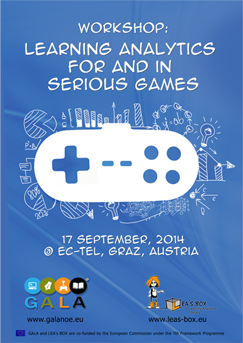|
Over the last decade, serious games have become accepted
educational tools and the idea of using the great strength
of modern computer games for educational purposes experienced
a significant boost. From an educational perspective, computer
games offer a promising approach to make learning more engaging,
satisfying, and probably more effective.
However, playing experience
and learning motivation are fragile assets; to be enjoyable,
a computer game must be balanced well, meaning the game must
match an individual player’s playing preferences, playing
styles, and playing capabilities in a suitable way in order
to too one-sided gameplay. An appropriate adaptation is of
crucial importance in order to reach and maintain fun and
enjoyment on the one hand and effective, successful learning
on the other hand.
The starting point of an educationally
suitable adaptation and good game-balancing is to equip the
game with and understanding of the learning domain, aspects
and characteristics of the player and, in particular, an understanding
about what is going on in the game, for example, motivational
states or learning performance. Thus, seamless user performance
assessment is a major research topic. It is not a trivial
to assess and interpret activity data coming from the game
in an unobtrusive manner in order not to harm the gaming experience
and perhaps ‘flow’ and requires intelligent technologies.
A recent trend in educational
technology is educational data mining (EDM) and learning analytics
(LA). The fundamental idea of learning analytics is not new,
in essence, the aim is using as much information about learners
as possible to understand the meaning of the data in terms
of the learners’ strengths, abilities, knowledge, weakness,
learning progress, attitudes, and social networks with the
final goal of providing the best and most appropriate personalized
support.
At this point educational adaptation,
game balancing, seamless assessment and EDM/LA meet. New educational
technologies leverage the potential of serious games and increase
their educational depth.
The workshop is organized around and out of 2 European projects;
the GALA
Network of Excellence (www.galanoe.eu) and LEA’s
BOX (www.leas-box.eu). The goal of the worship is bringing
together different research disciplines, technological approaches
as well as practitioners in order to discuss this broad conceptual
area from a broad range of perspective.
 |
Accepted Presentations (click to download
the presentations):
» Download
the proceedings
booklet (PDF, 3MB)
Pictures of the workshop:
|
|
|